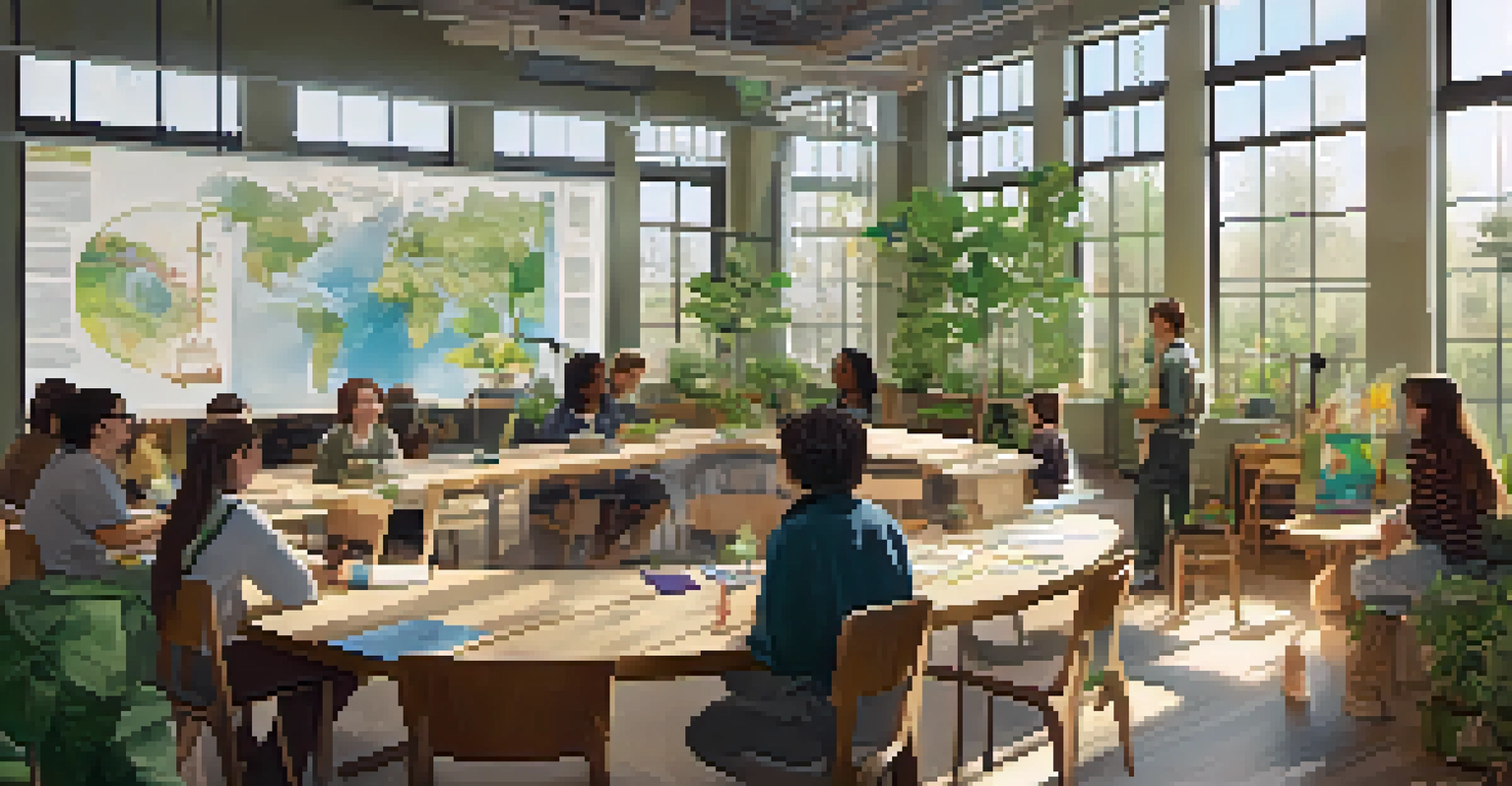Student-Led Initiatives: Driving Community Change at MSU

The Power of Student-Led Initiatives at MSU
At Michigan State University (MSU), students are not just learners; they are change-makers. Through various initiatives, they tap into their creativity and passion to address pressing community issues. This unique approach not only empowers students but also enriches the community around them, fostering a spirit of collaboration and innovation.
The best way to find yourself is to lose yourself in the service of others.
These initiatives range from environmental sustainability projects to social justice campaigns, demonstrating the diverse interests of the student body. By taking the lead, students develop critical skills such as leadership, teamwork, and problem-solving, which are invaluable in their future careers. More importantly, they create tangible impacts that benefit their peers and the broader community.
The excitement surrounding these projects often leads to increased engagement among the student population, encouraging more individuals to get involved. This ripple effect amplifies the positive changes initiated by students, proving that their contributions can inspire others to take action. Ultimately, these efforts help to create a vibrant and responsive campus culture.
Spotlight on Successful Student Initiatives
One notable example is the MSU Green Team, a student-led organization focused on promoting sustainability on campus. They organize events like campus clean-ups and educational workshops that raise awareness about environmental issues. Through their initiatives, they have successfully reduced waste and encouraged recycling among students, illustrating the power of collective action.

Another impactful group is the Student Advocacy Coalition, which aims to address social justice issues within the community. They engage in dialogue with university administration and organize campaigns that highlight the need for policy changes. Their efforts not only bring attention to important issues but also foster a sense of belonging among marginalized groups.
Empowering Change Through Leadership
At MSU, student-led initiatives empower learners to become change-makers, addressing community issues while developing essential skills.
These initiatives serve as powerful reminders of what can be achieved when students unite for a common cause. By focusing on real-world challenges, they not only enhance their own educational experience but also contribute to a more equitable and sustainable society. Their success stories inspire other students to take the leap and start their own initiatives.
Building Skills Through Community Engagement
Participating in student-led initiatives provides invaluable opportunities for skill development. Students learn to navigate challenges, communicate effectively, and work collaboratively with diverse groups. These experiences prepare them for the workforce and instill a strong sense of civic responsibility.
Education is the most powerful weapon which you can use to change the world.
For instance, organizing events requires planning, budgeting, and public speaking skills, all of which are essential in any career. Students often find that the practical experience gained from leading initiatives far outweighs traditional classroom learning. This hands-on approach not only enhances their resumes but also boosts their confidence.
Moreover, the relationships formed through these initiatives often lead to mentorship opportunities and professional networking. Alumni who were once involved in similar projects frequently return to guide current students, creating a supportive community that extends beyond graduation. This cycle of giving back fosters a culture of mentorship that benefits all involved.
Collaborations Between Students and Local Organizations
Many student-led initiatives thrive on collaboration with local nonprofits and community organizations. These partnerships allow students to gain insights from experienced professionals while providing organizations with fresh ideas and energy. Such collaborations can amplify the impact of community projects, leading to greater success.
For example, a partnership between MSU students and a local food bank led to the development of a food recovery program. This initiative not only helped reduce food waste but also provided meals to those in need. By working together, students and organizations can address issues more effectively and sustainably.
Collaboration Enhances Impact
Partnerships between students and local organizations amplify the effectiveness of initiatives and foster community connections.
These collaborations also create a sense of community between students and residents, bridging the gap between campus and the surrounding area. They encourage dialogue and understanding, ensuring that student initiatives are relevant and responsive to community needs. Ultimately, this fosters a culture of mutual support and shared goals.
The Role of Faculty and Administration Support
Support from faculty and university administration plays a crucial role in the success of student-led initiatives at MSU. Faculty members often act as mentors, providing guidance and resources to help students achieve their goals. Their involvement legitimizes student efforts and encourages more students to participate.
Additionally, university administration can facilitate connections between students and external organizations, enhancing the scope of initiatives. By recognizing the importance of student-led projects, the administration can allocate funding and resources to support these endeavors. This support signals to students that their voices matter and that their contributions are valued.
When students feel supported, they are more likely to take risks and pursue innovative ideas. This creates an environment where creativity flourishes, allowing for a diverse range of initiatives that can address various community issues. Ultimately, this partnership between students and the university strengthens the overall impact of the initiatives.
Overcoming Challenges in Community Initiatives
While student-led initiatives can create significant change, they often face challenges along the way. Limited resources, time constraints, and varying levels of engagement can hinder progress. However, these obstacles provide valuable learning experiences that help students grow and adapt.
For instance, students may struggle with securing funding for their initiatives. This challenge often forces them to think creatively, seeking alternative funding sources or developing low-cost solutions. Such experiences sharpen their problem-solving skills and teach them the importance of perseverance.
Support Fuels Student Initiatives
Faculty and administration support is crucial for the success of student-led projects, encouraging innovation and risk-taking.
Additionally, varying levels of interest among peers can be a hurdle. However, this can also serve as an opportunity for students to practice effective communication and outreach strategies. By learning how to engage others and articulate their vision, students can build stronger, more inclusive initiatives that resonate with a broader audience.
The Future of Student-Led Initiatives at MSU
As MSU continues to evolve, the future of student-led initiatives looks promising. With a growing emphasis on experiential learning, more students are encouraged to engage in community projects. This trend is likely to lead to an increase in innovative initiatives that address both local and global challenges.
Furthermore, advancements in technology provide new tools for collaboration and outreach. Students can leverage social media to amplify their messages and connect with a wider audience, enhancing the visibility of their initiatives. This digital landscape opens doors for creative solutions and impactful campaigns.

Ultimately, the spirit of student-led initiatives at MSU will continue to thrive as long as students remain passionate about creating change. Their commitment to making a difference not only enriches their own experiences but also strengthens the community as a whole. The legacy of these initiatives will inspire future generations of students to take action and drive positive change.